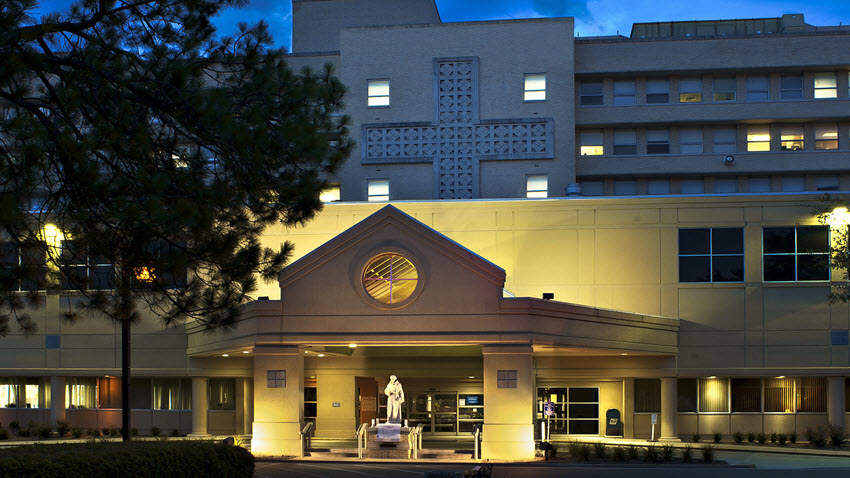
Imaging Services
St. Francis Community Health Center
2600 Tower Drive | Monroe, LA 71201
Our conveniently located outpatient center offers a wide range of diagnostic imaging services:
- CT scanning featuring 160-slice CT scanner with SURECardio technology for increased accuracy of coronary imaging (latest technology available in Northeast Louisiana)
- MRI (latest technology available in Northeast Louisiana)
- 3D mammography / 3D biopsy
- Breast MRI / Breast MRI biopsy
- EKG
- Ultrasound
- Bone densitometry
- Digital x-rays
A physician's order is required for imaging services.
Our hours are Monday - Friday 8 am - 4:30 pm. Walk-ins are welcome for routine x-rays and EKG studies. All other studies need to be scheduled by calling (318) 966-4700.
For more information call (318) 966-6265.
St. Francis Medical Center - Downtown
309 Jackson Street | Monroe, LA 71201
Our downtown campus offers a full range of medical imaging services including diagnostic and interventional procedures. Board certified radiologists, medical doctors uniquely qualified to interpret these diagnostic images, are on staff and available 24/7. The technical staff, made up of licensed technologists, works closely with physicians to conduct these procedures:
- Digital x-rays
- Fluoroscopy
- CT scanning featuring 160-slice CT scanner with SURECardio technology for increased accuracy of coronary imaging and SURESubtraction technology allowing pre- and post-IV contrast imaging in a single scan.
- MRI
- Nuclear Medicine
- CT/PET scanning
- Ultrasound
A physician's order is required for imaging services. All imaging procedures at our hospital campus need to be scheduled by calling (318) 966-4700.
Computerized Axial Tomography (CT Scanning)
Unlike other traditional x-ray technology, Computerized Axial Tomography (commonly known as CT Scanning) is particularly useful because it can provide images of soft tissue such as organs and fat. It can be used to detect size and location of tumors, blood vessel abnormalities, and blood clots.
Magnetic Resonance Imaging (MRI)
Magnetic Resonance Imaging (MRI) is an exam that utilizes a large Magnet and Radio Waves that create images to detect brain tumors, strokes, and certain chronic disorders of the nervous system such as multiple sclerosis. It is also used to document brain abnormalities in patients with dementia, and it can detect tissue abnormality in patients with disease of the eyes or the inner ear. It is also used in the diagnosis and treatment of tumors, knee and shoulder injuries, musculoskeletal malformations, Spine and Spinal Cord issues and blood vessel disorders.
Nuclear Medicine
Nuclear Medicine uses radioactive isotopes to diagnose and treat disease. These techniques are used to image organs including the lungs, liver, bone studies, and cardiac scans which show heart wall damage by imaging the heart at resting stage and stress exercise.
CT/PET Scanning
This technology marries the technology of CT and nuclear medicine giving a cutting-edge level of information and is good at meeting the needs and demands of the medical community including radiologists, nuclear medicine professionals, radiation oncologists, surgical oncologists and other referring physicians in the following ways:
- Accurate location of lesions, identification of benign versus malignant lesions, and differentiation from scar tissue.
- Excellent sensitivity and specificity, resulting in clinical confidence and the potential reduction of false positives and false negatives.
- Information to help physicians stage cancer.
- Information to aid in surgical and radiation treatment planning.
- The ability to monitor the effectiveness of treatment and adjust the plan during, rather than at the end of, treatment.
Low-Dose CT Lung Cancer Screening
A low-dose CT scan is a quick screening test proven to reduce lung cancer deaths among individuals who have a greater risk of developing lung cancer. We offer a low-dose CT scan for lung cancer at St. Francis PET Imaging, located at 411 Calypso Street in Monroe. Research shows that this screening can help detect early lung cancer before symptoms become evident.
Patients who meet the following criteria should consult their healthcare provider to discuss the need for a lung cancer screening:
- are 50-80 years of age
- have tobacco smoking history of at least 20 pack-years (one pack-year = smoking one pack per day for one year; 1 pack = 20 cigarettes)
- are a current smoker or have quit within the past 15 years
Ultrasound
Unlike radiology procedures, Ultrasound studies do not utilize radiation to produce images. Sound waves are used similar to Sonar t o produce images of the soft tissue of the body. This type of exam is very useful in pregnancy to view the fetus and the growth of the fetus. Ultrasound is also used to detect abnormalities of the liver, gall bladder, major vessels, and small parts of the body.
If you have questions about the services offered by St. Francis Medical Center's Imaging Department, call (318) 966-4161.
